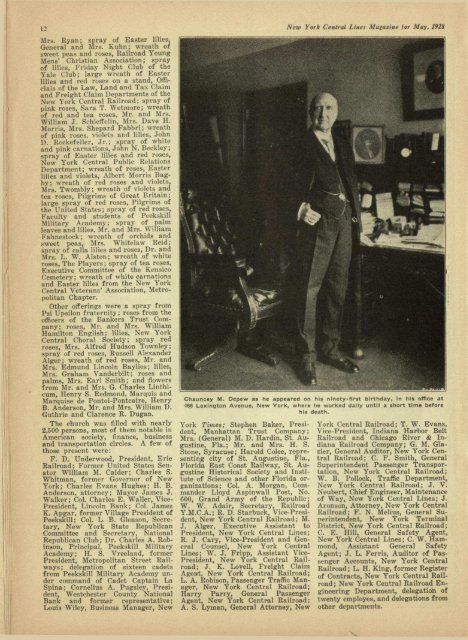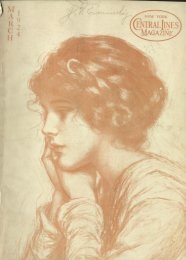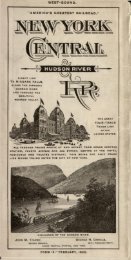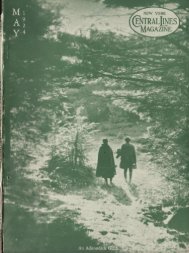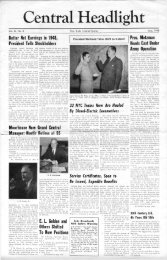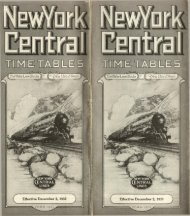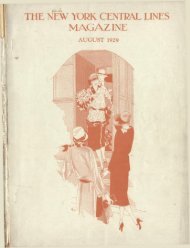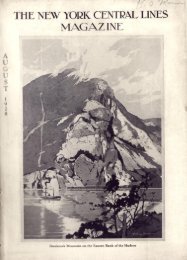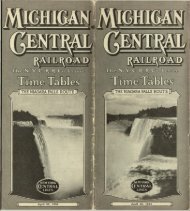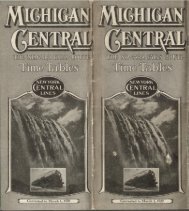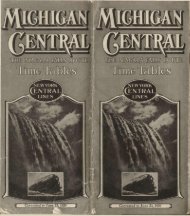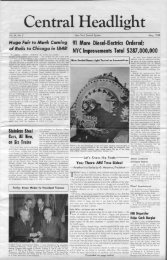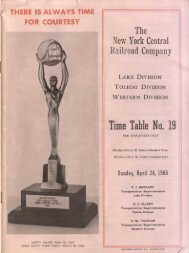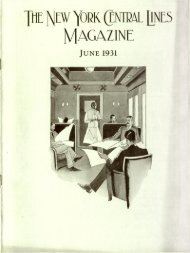You also want an ePaper? Increase the reach of your titles
YUMPU automatically turns print PDFs into web optimized ePapers that Google loves.
12<br />
Mrs. Ryan; spray of Easter lilies,<br />
General and Mrs. Kuhn; wreath of<br />
sweet peas and roses, Railroad Young<br />
Mens' Christian Association; spray<br />
of lilies, Friday Night Club of the<br />
Yale Club; large wreath of Easter<br />
lilies and red roses on a stand, Officials<br />
of the Law, Land and Tax Claim<br />
and Freight Claim Departments of the<br />
New York Central Railroad; spray of<br />
pink roses, Sara T. Wetmore; wreath<br />
of red and tea roses, Mr. and Mrs.<br />
William J. Schieffelin, Mrs. Dave H.<br />
Morris, Mrs. Shepard Fabbri; wreath<br />
of pink roses, violets and lilies, John<br />
D. Rockefeller, Jr.; spray of white<br />
and pink carnations, John N. Beckley;<br />
spray of Easter lilies and red roses,<br />
New York Central Public Relations<br />
Department; wreath of roses, Easter<br />
lilies and violets, Albert Morris Bagby;<br />
wreath of red roses and violets,<br />
Mrs. Twombly; wreath of violets and<br />
tea roses, Pilgrims of Great Britain;<br />
large spray of red roses, Pilgrims of<br />
the United* States; spray of red roses,<br />
Faculty and students of Peekskill<br />
Military Academy; spray of palm<br />
leaves and lilies, Mr. and Mrs. William<br />
Fahnestock; wreath of orchids and<br />
sweet peas, Mrs. Whitelaw Reid;<br />
spray of calla lilies and roses, Dr. and<br />
Mrs. L. W. Alston; wreath of white<br />
roses, The Players; spray of tea roses,<br />
Executive Committee of the Kensico<br />
Cemetery; wreath of white carnations<br />
and Easter lilies from the New York<br />
Central Veterans' Association, Metropolitan<br />
Chapter.<br />
Other offerings were a spray from<br />
Psi Upsilon fraternity; roses from the<br />
officers of the Bankers Trust Company;<br />
roses, Mr. and Mrs. William<br />
Hamilton English; lilies, New York<br />
Central Choral Society; spray red<br />
roses, Mrs. Alfred Hudson Townley;<br />
spray of red roses, Russell Alexander<br />
Alger; wreath of red roses, Mr. and<br />
Mrs. Edmund Lincoln Baylies; lilies,<br />
Mrs. Graham Vanderbilt; roses and<br />
palms, Mrs. Earl Smith; and flowers<br />
from Mr. and Mrs. G. Charles Linthicum,<br />
Henry S. Redmond, Marquis and<br />
Marquise de Pontoi-Pontcaire, Henry<br />
B. Anderson, Mr. and Mrs. William D.<br />
Guthrie and Clarence R. Dugan.<br />
The church was filled with nearly<br />
2,500 persons, most of them notable in<br />
American society, finance, business<br />
and transportation circles. A few of<br />
those present were:<br />
F. D. Underwood, President, Erie<br />
Railroad; Former United States Senator<br />
William M. Calder; Charles S.<br />
Whitman, former Governor of New<br />
York; Charles Evans Hughes; H. B.<br />
Anderson, attorney; Mayor James J.<br />
Walker; Col. Charles E. Waller, Vice-<br />
President, Lincoln Bank; Col. James<br />
K. Apgar, former Village President of<br />
Peekskill; Col. L. B. Gleason, Secretary,<br />
New York State Republican<br />
Committee and Secretary, National<br />
Republican Club; Dr. Charles A. Robinson,<br />
Principal, Peekskill Military<br />
Academy; H. S. Vreeland, former<br />
President, Metropolitan Street <strong>Railway</strong>s;<br />
delegation of sixteen cadets<br />
from Peekskill Military Academy under<br />
command of Cadet Captain La<br />
Spina; Cornelius A. Pugsley, President,<br />
Westchester County National<br />
Bank and former representative;<br />
Louis Wiley, Business Manager, New<br />
New York Central Lines Magazine for May, 1928<br />
Chauncey M. Depew as he appeared on his ninety-first birthday, in his office at<br />
466 Lexington Avenue, New York, where he worked dally until a short time before<br />
his death.<br />
York Times; Stephen Baker, President,<br />
Manhattan Trust Company;<br />
Mrs. (General) M. D. Hardin, St. Augustine,<br />
Fla.; Mr. and Mrs. H. S.<br />
Stone, Syracuse; Harold Colee, representing<br />
city of St. Augustine, Fla.,<br />
Florida East Coast <strong>Railway</strong>, St. Augustine<br />
Historical Society and Institute<br />
of Science and other Florida organizations;<br />
Col. A. Morgan, Commander<br />
Lloyd Aspinwall Post, No.<br />
600, Grand Army of the Republic;<br />
W. W. Adair, Secretary, Railroad<br />
Y.M.C.A.; R. D. Starbuck, Vice-President,<br />
New York Central Railroad; M.<br />
J. Alger, Executive Assistant to<br />
President, New York Central Lines;<br />
R. J. Cary, Vice-President and General<br />
Counsel, New York Central<br />
Lines; W. J. Fripp, Assistant Vice-<br />
President, New York Central Railroad;<br />
J. K. Lovell, Freight Claim<br />
Agent, New York Central Railroad;<br />
L. A. Robison, Passenger Traffic Manager,<br />
New York Central Railroad;<br />
Harry Parry, General Passenger<br />
Agent, New York Central Railroad;<br />
A. S. Lyman, General Attorney, New<br />
York Central Railroad; T. W. Evans,<br />
Vice-President, Indiana Harbor Belt<br />
Railroad and Chicago River & Indiana<br />
Railroad Company; G. M. Glazier,<br />
General Auditor, New York Central<br />
Railroad; C. F. Smith, General<br />
Superintendent Passenger Transportation,<br />
New York Central Railroad;<br />
W. B. Pollock, Traffic Department,<br />
New York Central Railroad; J. V.<br />
Neubert, Chief Engineer, Maintenance<br />
of Way, New York Central Lines; J.<br />
Aronson, Attorney, New York Central<br />
Railroad; F. N. Melius, General Superintendent,<br />
New York Terminal<br />
District, New York Central Railroad;<br />
C. E. Hill, General Safety Agent,<br />
New York Central Lines; C. W. Hammond,<br />
Assistant General Safety<br />
Agent; J. L. Ferris, Auditor of Passenger<br />
Accounts, New York Central<br />
Railroad; L. H. King, former Register<br />
of Contracts, New York Central Railroad;<br />
New York Central Railroad Engineering<br />
Department, delegation of<br />
twenty employes, and delegations from<br />
other departments.<br />
New York Central Lines Magazine for May, 1928 13<br />
Chauncey M . Depew's Notable Career<br />
HEN Chauncey M. Depew died,<br />
one of the notable figures in<br />
American history passed from the<br />
stage. In the rare quality of his many<br />
gifts, in the soundness of his judgment,<br />
the diversity of his interests,<br />
in the extraordinary extent of his<br />
friendships among the elect of the<br />
world, in the importance of his<br />
achievements, he ranked among the<br />
foremost men who have contributed<br />
to America's greatness.<br />
But a sad world which takes itself<br />
too seriously for its own good will<br />
remember Chauncey Depew longest<br />
and most fondly as a raconteur who<br />
had no peer throughout his long life.<br />
Newspapers were always glad to publish<br />
Depew's latest, men never tired<br />
of passing his stories along by word<br />
of mouth.<br />
It would be a mistake to under-rate<br />
Depew's rare gift for story telling.<br />
Indeed, it would be hard to over-estimate<br />
its importance. He was an orator<br />
of unusual charm and his stories<br />
were interpolated to drive home a<br />
point or to whip up interest in the<br />
truths he was driving home. In his<br />
after-dinner speeches, in which he was<br />
at his best, Depew sought recreation<br />
and relaxation for himself, as other<br />
men play golf or hunt or fish or ride;<br />
and they served his purpose. He estimated<br />
that he had attended 8,000<br />
banquets and he was a speaker at<br />
many of them. His published speeches<br />
filled nineteen volumes. They constitute<br />
but a fraction of the total.<br />
He had no thought, perhaps, of<br />
turning his genius as an orator to<br />
practical account in promoting traffic,<br />
yet it was undoubtedly a factor the<br />
value of which would be difficult to<br />
compute in shaping the destinies of<br />
the great railroad system with which<br />
he was associated for so many years.<br />
Perhaps it would not be amiss to call<br />
Depew one of the greatest salesmen<br />
America ever produced. In a gathering<br />
of men of affairs his congenial<br />
good fellowship, his wit and humor,<br />
created an impression that could not<br />
fail to continue into the next business<br />
day and, by a natural association of<br />
ideas, bring the mind around to the<br />
railroad whose president had made an<br />
evening delightful.<br />
The Family of Depew<br />
Chauncey Mitchell Depew was born<br />
in Peekskill, N. Y., April 23, 1834, the<br />
son of Isaac and Martha (Mitchell)<br />
Depew.<br />
He was the oldest of the family,<br />
which included two brothers and two<br />
sisters. His father, Isaac Depew, a<br />
prominent merchant, was a lineal descendant<br />
in the sixth generation of<br />
Francois Du Puy, a Huguenot who<br />
fled from France in 1651 to escape<br />
from the religious persecutions of that<br />
period, going first to the Netherlands<br />
and ten years later to New Amsterdam,<br />
where he married Geertje Willems<br />
in 1661. The name Du Puy is<br />
an ancient one, having been prominent<br />
as early as the eleventh century.<br />
It has undergone many changes in its<br />
transformation from French through<br />
Dutch into English, being recorded as<br />
Dupuis, Dupui, Dupuy, Depee, Depuy,<br />
De Pue, Depu, Depew, etc. The village<br />
of Peekskill, founded in 1764, is<br />
on land which belonged to the fatherin-law<br />
of Francois Du Puy and to his<br />
descendants.<br />
On his mother's side, Mr. Depew's<br />
ancestry included the Mitchells, Shermans,<br />
Palmers, Winships, Wellingtons,<br />
Minots and Johnstons, all notable<br />
families.<br />
When he was about five years old<br />
his mother took him to the school of<br />
Mrs. Westbrook, wife of a pastor of<br />
the Dutch Reformed Church. Mrs.<br />
Westbrook was a highly educated woman<br />
and her husband was a man of<br />
letters as well as a teacher. He specialized<br />
in ancient history and the interest<br />
he aroused in Roman and Greek<br />
culture and achievements continued<br />
with Mr. Depew throughout his life.<br />
Young Chauncey was regarded as a<br />
prodigy and became a leader among<br />
the boys of the village.<br />
To School in His Native Town<br />
Later on Mr. Depew attended<br />
Peekskill Academy, a character-making<br />
institution, the graduates from<br />
which entered professions or business<br />
where they made an unusual record<br />
of success. Depew graduated from<br />
the Academy in 1852. The program<br />
of exercises for that day saw Mr.<br />
Depew launched even then on his long<br />
career as a speaker; for he was down<br />
for several original speeches while the<br />
other boys merely had recitations.<br />
Another educational opportunity of<br />
which Mr. Depew himself spoke more<br />
than once came in his way because one<br />
of his uncles was postmaster at Peekskill.<br />
Through the post office came<br />
several high class magazines and foreign<br />
reviews. There was no rural delivery<br />
in those days and the mail could<br />
only be had on personal application,<br />
and the result was that the subscribers<br />
for these periodicals frequently<br />
left them a long time before they were<br />
called for. Depew was an omnivorous<br />
reader and as a result these publications,<br />
especially the foreign reviews,<br />
became a fascinating source of information<br />
and culture.<br />
Still another unincorporated yet valuable<br />
school which Mr. Depew himself<br />
confessed having attended, was the<br />
frequent sessions at the drug store of<br />
the elder statesmen of the village.<br />
On certain evenings these men would<br />
avail themselves of the hospitable<br />
chairs about the stove and discuss not<br />
only local matters, but general conditions<br />
in the country, some of the<br />
discussions revolving about the provisions<br />
of various measures which had<br />
been proposed and enacted into laws.<br />
They usually related to slavery, the<br />
compromise measures, the introduction<br />
of slaves into new territories, the<br />
fugitive slave law, and they were handled<br />
with much intelligence and information.<br />
The boys of the village<br />
were eager listeners on the outskirts<br />
of this congress. These village store<br />
discussions throughout the country<br />
were the most important factors in<br />
forming that public opinion, especial<br />
ly among the young, which supported<br />
Mr. Lincoln in his successful efforts<br />
to save the Union at whatever cost.<br />
But perhaps the most important<br />
influence in shaping the character of<br />
young Depew was his mother, a woman<br />
of unusual intellect bordering<br />
upon genius. There were no means<br />
of higher education for girls at that<br />
period, but her father, who was an<br />
eminent lawyer, and her grandfather,<br />
a judge, finding her so receptive, educated<br />
her with the care that was given<br />
to boys who were intended for a professional<br />
life. She was well versed in<br />
the literature of the times of Queen<br />
Elizabeth and Queen Anne and, with<br />
a retentive memory, knew by heart<br />
many of the English classics. She<br />
wrote well, but never for publication.<br />
Attached to these accomplishments<br />
were rare good sense and prophetic<br />
vision. Mr. Depew once said, "The<br />
foundation and much of the superstructure<br />
of all that I have, and all<br />
that I am, were her work."<br />
Isaac Depew had placed Chauncey<br />
in the Academy in the hope that he<br />
would join him in business, but the<br />
youth, influenced probably by his<br />
mother and Dr. Westbrook, had visions<br />
of a more ambitious career. The result<br />
was that he was sent to Yale<br />
University in 1852, graduating in<br />
1856, in a class of 125 that became<br />
famous, partly on account of the general<br />
high standing in the professions<br />
its members later attained, two of<br />
whom reached the bench of the United<br />
States Supreme Court. In this class<br />
Depew made his mark, particularly<br />
by his gifts as a speaker.<br />
Legal Practice Begun<br />
After graduating from Yale, Mr.<br />
Depew entered the office of Edward<br />
Wells, a lawyer of Peekskill, as a<br />
student. He was admitted to the<br />
Bar in 1858 and immediately opened<br />
an office in the village. Here is Mr.<br />
Depew's own account of his first client:<br />
"My first client was a prosperous<br />
farmer who wanted an opinion on a<br />
rather complicated question. I prepared<br />
the case with great care. He<br />
asked me what my fee was and I told<br />
him five dollars. He said 'a dollar and<br />
seventy-five cents is enough for a<br />
young lawyer like you.' Subsequently<br />
he submitted the case to one of the<br />
most eminent lawyers in New York,<br />
who came to the same conclusion and<br />
charged him $500. On account of this<br />
gentleman's national reputation, the<br />
farmer thought that fee was very<br />
reasonable. In subsequent years I<br />
have received several very large retainers,<br />
but none of them gave so<br />
much satisfaction as that dollar and<br />
seventy-five cents which I had actually<br />
earned after having been so long dependent<br />
on my father."<br />
Mr. Depew's political career began<br />
very early. He entered Yale as a<br />
Democrat, his father's party, but the<br />
debates on the campus soon convinced<br />
him that he was on the wrong side<br />
of the great questions of the day. In<br />
1853 he cast his lot with the "Anti-<br />
Nebraska men," who, early in 1856,


